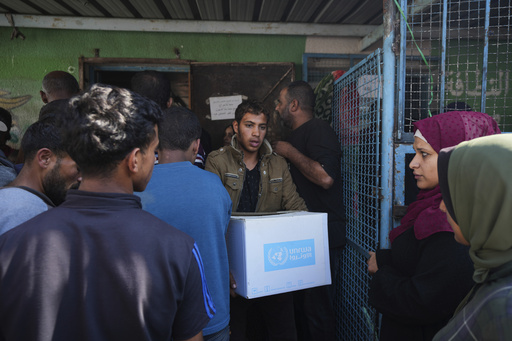
GENEVA — The newly appointed leader of the U.N. humanitarian aid organization has indicated a firm approach to how funds will be allocated, particularly in the face of fundraising obstacles for civilians living in conflict zones such as Gaza, Sudan, Syria, and Ukraine.
Tom Fletcher, a veteran British diplomat who assumed this role last month, announced that his agency plans to request less funding for 2025 compared to the current year, emphasizing a commitment to strategically focus their resources amidst an increasing number of prolonged humanitarian crises.
The U.N. Office for the Coordination of Humanitarian Affairs released its global appeal for 2025 on Wednesday, aiming to secure $47 billion to assist 190 million individuals across 32 countries, while the total estimated number of people in need of aid worldwide has reached 305 million.
“The world is on fire, and this is how we put it out,” Fletcher remarked during a press conference on Tuesday.
In recent years, the office and various other aid organizations—including the international Red Cross—have experienced dwindling donations for both longstanding hotspots like Syria and South Sudan as well as newer crises, including those in Ukraine and Sudan. Accessibility for aid has become increasingly challenging, particularly in regions like Sudan and Gaza.
As of last month, only 43% of the $50 billion appeal made for this year had been fulfilled—a shortfall that has led to an 80% reduction in food assistance for Syria, where violence has recently intensified.
Funding from these appeals is allocated to U.N. agencies and over 1,500 partner organizations.
The largest requests for 2025 include $8.7 billion for Syria—addressing needs both domestically and for its refugee-hosting neighbors—$6 billion for Sudan, $4 billion for the “Occupied Palestinian Territory,” approximately $3.3 billion for Ukraine, and nearly $3.2 billion for Congo.
Fletcher emphasized the need to be “ruthless” in identifying and delivering aid to those in greatest need, carefully choosing his words to highlight the critical nature of prioritizing funding allocation for maximum impact.
“It’s a recognition that we have struggled in previous years to raise the money we need,” he explained.
When asked about the anticipated spending on humanitarian aid from the incoming U.S. administration led by President-elect Donald Trump, Fletcher expressed his intentions to engage in discussions in Washington over the forthcoming months regarding these efforts.
“America is very much on our minds at the moment,” he stated, recognizing that some governments may approach the U.N.’s role with skepticism regarding the humanitarian initiatives described in the recent report.
This year has marked a particularly deadly period for humanitarian workers and U.N. personnel, largely stemming from escalations in the Middle East following the deadly attacks by Palestinian militants in Israel on October 7, 2023.
